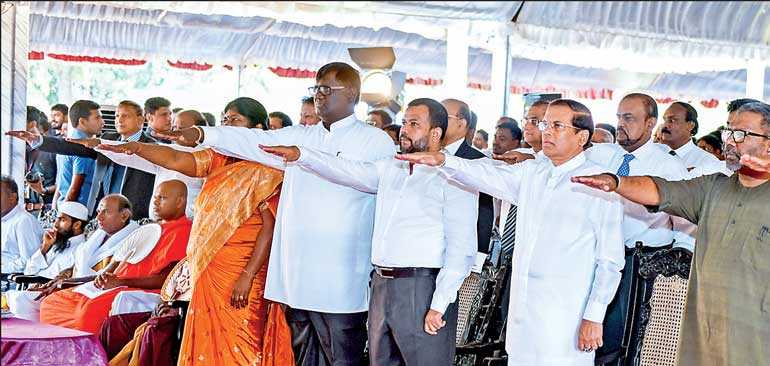Sunday Feb 22, 2026
Sunday Feb 22, 2026
Friday, 25 January 2019 00:10 - - {{hitsCtrl.values.hits}}

In mid-2018, national cricketer and erstwhile captain Tillakaratne Dilshan sang the praises of President Maithripala Sirisena for taking a certain executive decision. That was to implement the death penalty – customarily commuted to life imprisonment – for drug traffickers, widely considered to be the bane of Sri Lankan society. The inventor of the innovative Dil-scoop waxed eloquent on extending the hangman’s noose to other nefarious activities for which our island-nation has attracted notoriety of late. He is reported to have said at the time: “Not only for drugs; it should be implemented for child abuse and rape cases also!” Howzaat? 
Be that sportsman’s hanging judge mentality as it may, one wonders how he would feel today – in early 2019 – at his chief executive’s newfound approach to the war on drugs in our blessed isle. Our head of state, perhaps in another fit of pique for which is he becoming justifiably famous, hymned paeans to the modus operandi adopted by his hero, President Duterte of the Philippines. That latter worthy’s attitude has been more out of vigilante movies like Batman than a balanced sense of justice befitting a country’s leader. It entails the type of social justice favoured by armchair sociopaths and folks on the psychotic fringe.
Et tu, Duterte!
A suspension of the rule of law and order, and the imposition of rule by law and outrage against antisocial crimes, has been the norm there. The President of the Philippines came into power in mid-2016 after promising to ‘neutralise’ the drug menace in his country. That programme has seen the Filipino police and members of the public join hands to eliminate suspected criminals especially drug addicts.
The Philippines’ war on drugs – with its estimated three million addicts (1.8 mil in 2015 and on the rise) at the time Duterte entered the scene contra his narco-state – has pros and cons, if looked at objectively (which is hard to do when over 50 street children were killed in its first year). Today, Davao City is among the safest places thanks to Duterte’s death squads, which ruthlessly killed drug users, pushers and other petty criminals. That has not served to reduce its extreme incidence of murder and rape. China, Japan and the US have admitted an albeit grudging respect for the policy. Human-rights watchdogs have barked their heads off at the 12,000-plus death toll so far (the state admits to some 4,200 of these while the political opposition cites a figure as high as 20,000).
There has been a widespread local and international outcry against the movement, despite its lawful potential to rid a nation of awful drug lords in high and drug pushers in low dives. Much of the fuss has been about the alleged abuses whereby law-enforcement officials have been accused of planting contraband – both drugs and guns – and routinely executing unarmed suspects in police custody. And even though systematic extrajudicial executions are nothing new to banana republics, the rest of the Philippines is not exactly a savage place – until President ‘Justice League’ Duterte, at least.

To be fair by Maithri, he is not quite the manic berserker that the man in Manila may seem to be. Our man in Colombo is more of a mousy coup plotter than a coldly smiling executive assassin. Thus his backtracking on the public affirmation of his Filipino counterpart’s MO vis-à-vis the drug war. Of course, the cynics have questioned whether it was prudence on the part of the president – even as an afterthought in the wake of shooting his mouth off again – or cold, calculating practicality. After all, how many noble provincial councillors, honourable members of parliament or esteemed cabinet rankers would Sirisena have to shoot to put his money where his mouth had been?
Ars longa, vita brevis
I suspect life might imitate art. My mind goes back to a British TV series of which I was a fan then: Blake’s 7. One particular episode remains pertinent as regards our war on drugs. That eponymous hero, a political agitator against a corrupt military dictatorship, the Federation, recruits a ragtag motley crew of criminals to rebel against galactic oppression.
Blake seeks to enlist the help of the notorious Terra Nostra – a systematic cartel dealing in general crime and terror but specialising in mind-numbing drugs – to wage a war on tyranny. While his initial efforts to persuade the Terra Nostra to join forces with him fails, Blake persists in his efforts to undermine the administration’s power in the outer planets using elements of the criminal underworld who might be willing to join the rebellion.
En route to that goal, the rebel leader discovers a dark secret that could blow the lid off the oppressive civilian administration. A planet on which the Terra Nostra’s source of power is located is discovered to be heavily guarded – by none other than Federation troops! The President of the Terran Administration oversees the production and distribution of Shadow, the narcotic that keeps billions of souls in abject slavery!
As one character remarks, it’s a subversive strategy: to control people at both ends of the power spectrum using a single power source. Law and order as well as lawlessness are both regulated from the same origin: the despotic political regime that operates simultaneously above and below the law.
In an article titled ‘A shadow falls over a drugged republic?’ (Daily FT, 26 July 2018), I explored the issue in some detail. So I won’t draw the lines again. But is it clear that many commentators are increasingly concerned about both the problem and its putative solutions. This on top of the alarming nexus between law and order and the ranks of criminality in high places.
For instance, a civil libertarian recently tweeted: “Ernest Gellner describes religious movements and political systems/actors latching on to each other as the symbiosis of ‘thugs’ and ‘legitimators’. Place this in the #lka context and you can see parallels, and perhaps even the interchangeability of roles #religion #politics.”
Shadow over the republic
She no doubt had in mind the political superculture in Sri Lanka. Whereby scurrilous party leaders can sedulously prevail on a sitting president to free troublesome monks and to release notorious prisoners. And maybe convicted drug smugglers cum public enemies by dint of murder and open warfare in the name of internecine drug mafia battles. Even a president caught between the rock of realpolitik and the hard place of Duterte worship would be hard-pressed to decide what to do.
Then again, there was the social media activist who maintained steadfastly that if the president was serious about his war on drugs, he’d have to lock up half of his inner circle of cupboard-chums (you know who, no) and not let the other half out of the lower circles of hell (you know where, right).
So however the war on drugs proceeds in the days ahead, with one eye on elections and the main chance growing near, by virtue of positioning oneself as the saviour of a once-righteous society, a few things are clear as a line of crack on a glass table. There is a distressing if not easily demonstrable connection between the penalising of drug traffickers and the power behind the throne of the shadow mafia pulling the strings.
However passionate the highest officials in the land may seem in public to rid us of this insidious threat, they might do well to examine in private their motives for doing so – or appearing to want to. Whatever Duterte may do, our democracy cannot afford another descent into an extrajudicial inferno of vigilante justice. Where political dissidents are harassed or killed in the name of vendettas against personal enemies while useful or powerful – or both types of – friends roam free.
It’s not cricket – whatever Dilshan may say. It’s Blake’s 7 all over again, except no would dare say the president is casting a shadow over the drug mafia in any way other than cracking down on it. With that said, let’s essay a more reasoned and reasonable resolution to the most pressing problem of our time. Not drugs or child abuse or rape. But the nexus between law and order and crime. And the hypocrisy that maintains the status quo so that whitened sepulchres can preach the gospel of social justice while practising realpolitik as if it were a sub legit joint.
(Journalist | Editor-at-large of LMD | Writer #SpeakingTruthToPower)